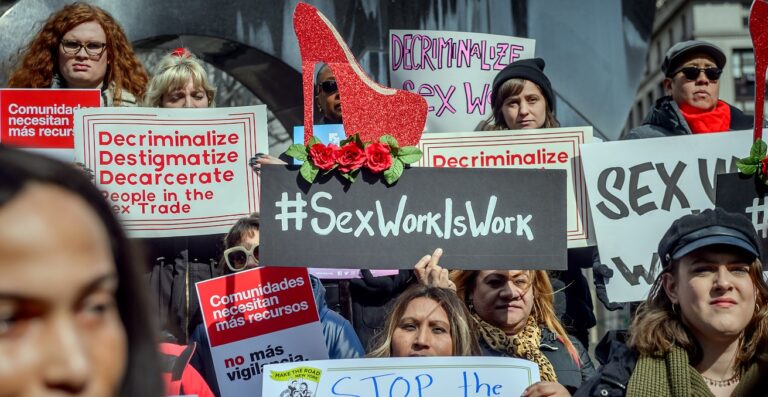San Francisco, California — Today, sex worker activist groups expressed outrage at the UN Human Rights Council’s Special Rapporteur report on Violence Against Women and Girls, authored by Reem Alsalem.
Groups signing on to this position include the Erotic Service Provider Legal Education and Research Project (ESPLERP) (http:/esplerp.org), C.O.Y.O.T.E. Rhode Island (https://coyoteri.org/), the Sidewalk Project (https://www.thesidewalkproject.org/), and the Sex Workers Outreach Project- Sacramento (https://sacramentoswop.org/).
“This report is a ‘hit job’ – an abuse of the UN Human Rights process”, said Maxine Doogan of ESPLERP. “The Special Rapporteur’s anti-prostitution position is very clear right at the start, she refuses to recognize sex work as legitimate form of work, and regurgitates false statements by discredited anti-prostitution campaigners. She clearly didn’t talk to (or listen to) any sex worker groups, and she fails to mention contradictory reports from multiple other UN human rights groups.”
“Reports like this have real world consequences,” said Terra Burns, of Alaska’s Community United For Safety and Protection (CUSP). “Anti-prostitution groups use them to lobby lawmakers to support their agenda of extremist laws further criminalizing sex work, abortion, and trans people. In the real world that exists outside of their ideological mission to control women’s bodies through the criminal justice system, these policies create serious harms, especially when workers and trafficking survivors are charged with felonies, made to register as sex offenders, or made easy targets for serial killers like Alaska’s Brian Steven Smith.”
“If the UN were to follow these recommendations, it would be devastating both to sex workers and free expression,” said Mike Stabile, Director of Public Policy at Free Speech Coalition. “By equating consensual sexual activity with torture and recommending that even the possession of sexually explicit images be criminalized, Alsalem is advocating for a sexual surveillance state to police every phone, camera and text — all in a desperate attempt to counter the growing decriminalization movement.”
Sex workers demand decriminalization!
Reem Alsalem (the Special Rapporteur) is far from being unbiased and independent. She has a long association with ‘gender critical feminist’ organizations – and with anti-prostitution, anti LGBTQI+, and anti-trans views. For example, in 2023, she opposed the Gender Recognition Reform (Scotland) Bill – where multiple feminist organizations in Scotland accused her of not speaking with Scottish human rights or feminist organizations before her statements. In 2023, she attended the gender-critical FiLiA conference. And more recently, she spoke at the Global Congress of CAP International and the CESE Summit of the National Center on Sexual Exploitation (NCoSE) – both of which are notorious anti-prostitution groups that also fund criminalizing LGTBQI+.
Her report reads like a long tirade against prostitution – where the author’s position is made clear from the start. It claims that the Special Rapporteur received 300 submissions “from a wide range of stakeholders, but then fails to list submissions “owing to the word limit”. It then goes on to uncritically repeat claims from (amongst others) Melissa Farley – who also has a long history in anti-prostitution campaigns, and whose evidence in a sex work case in a Canadian court was found by the Judge to be ‘inflammatory’ and ‘problematic’ (https://www.canlii.org/en/on/onsc/doc/2010/2010onsc4264/2010onsc4264.html).
It is also noteworthy that Reem Alsalem’s report largely fails to reference any academic work in the field. And it completely ignores the extensive and substantive work already performed in this area by other UN groups.
In contrast, in December 2023, The UN Human Rights Council Working Group on Discrimination Against Women and Girls released a much more comprehensive report – (https://www.ohchr.org/en/documents/tools-and-resources/guidance-document-working-group-discrimination-against-women-and. That report strongly supported the decriminalization of sex work ‘as it holds the greatest promise to address systemic discrimination and violence and the impunity for the violations of sex workers’ rights’.
The members of the Working Group are noted academics drawn from a wide geographic area – https://www.ohchr.org/en/special-procedures/wg-women-and-girls/members. And the report is both exhaustive and nuanced – with detailed discussion of different different feminist perspectives and policy approaches, a review of international standards on sex work, a review of (mostly positive) positions from other UN bodies, and a review of (again mostly positive) positions from non-governmental organizations – including the International Commission of Jurists. This report also notes that the ‘decriminalization of sex work is also advocated by a number of human rights organizations, including Amnesty International, Human Rights Watch, Open Society Foundations, the International Community of Women Living with HIV, the International Women’s Health Coalition, the Association for Women’s Rights in Development, the Global Alliance against Traffic in Women and the Global Fund for Women’.
Maya Linstrum-Newman (of the Global Alliance Against Traffic in Women (GAATW)) and Nadine Gloss (at the Global Network of Sex Work Projects) (see https://www.passblue.com/2024/05/30/sex-workers-welcome-un-experts-backing-to-decriminalize-the-industry/) note that the Working Group report ‘does not deny the injustices that occur in sex work. Instead, it makes clear how punitive laws, policies and practices create and exacerbate environments of violence, risk and abuse of sex workers. They must be understood to be workers, rather than “prostitutes” because they have lives outside of sex work, like most people who work and are not solely defined by their job identities or the circumstances of their work.’
###


